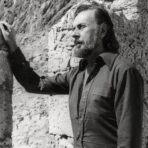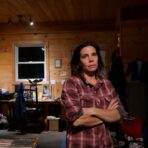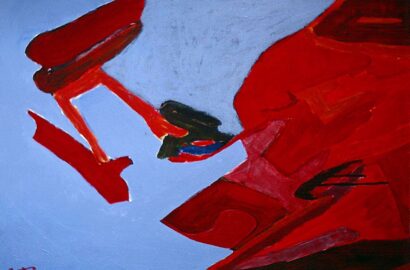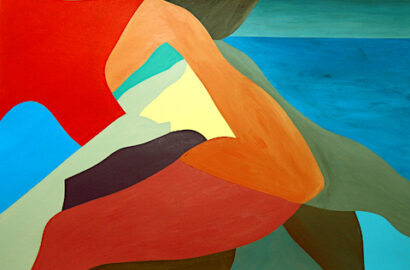Editor’s Note: This is the second installment in our selection of poems from Yannis Ritsos’s Exercises, a new collection of translations by Spring Ulmer, published by Ugly Duckling Presse. We’re delighted to showcase work by this poet of conscience, who was a member of the Greek resistance during World War II and later spent several years in prison camps during more than one authoritarian dictatorship, including the military junta that controlled Greece from 1967 to 1974. We are pleased to publish the poems in Greek and English, and to celebrate the legacy of this essential voice, whose example remains meaningful and necessary—not only in regard to his own moment but also in regard to the world in which we find ourselves.
CONSTANT EMBARRASSMENT
The one most loved, creates, precisely,
the most difficulty; like the piano, that big obstacle,
the kind old lady had
when she was evicted. The piano, left
out by the road, desolate, massive,
preventing both her own and others’ movement,
there on the dusty sidewalk, embarrassing,
—and if it started raining at night?—so embarrassing,
that unhappy three-legged monster, exposed
to the curiosity of children and miscellaneous others.
If she were to sell it, she could rid herself of rent
for a whole year. But, nothing doing.
It stayed there until nightfall, like a black casket
full of secret music. In the middle of the night,
it rained heavily. The next day,
neither the woman nor the piano were in the street.
This is what saved us from embarrassment.
⸻
ΣΤΑΘΕΡΗ ΑΜΗΧΑΝΙΑ
Αὐτὸ ποὺ πιότερο ἀγαποῦσε, αὐτὸ ἀκριϐῶς
τὸν δυσκόλευε πιότερο· μεγάλο ἐμπόδιο, σὰν τὸ πιάνο
ἐκείνης τῆς εὐγενικιᾶς, γριᾶς κυρίας
ὅταν τῆς ἔκαναν ἔξωση. Τὸ πιάνο, ἀπόμεινε
ἔξω στὸ δρόμο, ἐρημικό, πελώριο,
ἐμποδίζοντας τὴν ἴδια καὶ τοὺς ἄλλους,
ἐκεῖ στὸ σκονισμένο πεζοδρόμιο, ἄϐολο,
—κι ἄν ἔπιανε ϐροχὴ τὴ νύχτα;—ἔτσι ἄϐολο,
δυστυχισμένο τρίποδο τέρας, ἐκτεθειμένο
στὴν περιέργεια τῶν παιδιῶν καὶ τῶν ἀδιάφορων.
Ἄν τὸ πουλοῦσε, μπορεῖ νἄϐγαζε τὰ νοίκια
ἑνὸς ὁλόκληρου χρόνου. Ὡστόσο, τίποτα.
Ἔμεινε ἐκεῖ, ὥσπου νύχτωσε, σὰ μαῦρο φέρετρο
γεμάτο μυστικη μουσική. Τὰ μεσάνυχτα,
ἔπιασε δυνατὴ ϐροχή. Τὴν ἄλλη μέρα,
οὔτε ἡ γυναίκα οὔτε τὸ πιάνο ϐρίσκονταν στὸ δρόμο.
Ἔτσι γλυτώσαμε κ’ ἐμεῖς ἀπ’ τὴν ἀμηχανία.
NIGHT TEMPLE
His gaze was like the interior of a large temple in the middle of
the night.
Main gate open. Chandeliers off. The mysterious
candelabra prophesying unwaveringly across an indefinite depth,
the big, full-length iconographic paintings, in all their mystical
freedom
and elongated, vertical pallor, smelling of humidity,
melted wax, distant smoke, myrrh, and withered palm fronds.
A group passed by at midnight. Their first move:
to enter, pray, confess, kneel.
But they felt at once unprepared, guilty. Their knees were stiff.
Their shoes heavy, muddy. And the sparkle of the stars so far away.
They went around the cathedral wall by wall as soundlessly as
they could,
drawn to the pub. Soon, their drunken songs,
loud, almost rancorous, were heard. And across from them, the
door of the temple
gaped, terribly large and impassable in the night.
⸻
ΝΥΧΤΕΡΙΝΟΣ ΝΑΟΣ
Τὸ ϐλέμμα του εἴτανε σὰν τὸ ἐσωτερικὸ μεγάκου ναοῦ μέσα στὴ νύχτα.
Ἡ κεντρικὴ πύλη ἀνοιχτή. Σϐησμένοι οἱ πολυέλαιοι. Μαντεύονταν
τὰ σκοτεινὰ μανουάλια ἀσάλευτα σ’ ἕνα ϐάθος ἀόριστο
κ’ οἱ μεγάλες ὁλόσωμες εἰκόνες ποὺ εὐωδιάζανε ἀπ’ τὴν ὑγρασία
κερὶ λυωμένο, μακρινὴ καπνιά, μύρτα καὶ μαραμένα ϐάγια—
ἐκείνη ἡ μυστικὴ ἐλευθερια κ’ ἡ στενόμακρη, κάθετη ὠχρότητα.
Μιὰ συντροφιὰ πέρασε ἀπ’ ἔξω τὰ μεσάνυχτα. Ἡ πρώτη τους κίνηση:
νὰ μποῦνε μέσα, νὰ προσευχηθοῦν, νὰ ἐξομολογηθοῦν, νὰ γονατίσουν.
Μὰ ἔνιωσαν μονομιᾶς ἀνέτοιμοι, ἔνοχοι. Τὰ γόνατά τους ἄκαμπτα.
Βαριά, λασπωμένα τὰ παπούτσια τους. Κ’ οἱ σπίθες τῶν ἄστρων τόσο
ἀπόμακρες.
Ἔστριψαν τοῖχο – τοῖχο τὴ Μητρόπολη, ὅσο μποροῦσαν πιὸ ἀθόρυϐα
καὶ τράϐηξαν πιὸ κεῖ ὣς τὸ καπηλειό. Σὲ λίγο ἀκούστηκαν
τὰ μεθυσμένα τους τραγούδια, δυνατά, σχεδὸν πεισμωμένα. Κ’ ἡ πύλη τοῦ
ναοῦ
ἔχασκε, ἀπέναντι, τρομαχτικὰ μεγάλη κι ἀδιάϐατη, μέσα στὴ νύχτα.
MATINS
In the morning, before the children are even washed or dressed,
outdoors
the parade in the big light can be heard—the small street vendors,
the vegetable seller, ice man, charcoal seller,
knife-sharpener, wicker chair repairman, quilter; they march
with their poor tools, wheel, hammer, knife,
shovel, saw, stitchbow—they march, and their big,
thick, chanting voices precede them. Thus the road
becomes the illuminated narthex, its wide, radial rays
in the shadows of an invisible colonnade. Above two rows of houses
the morning’s all-white domes rise. And the vendors
proceed to the interior of the church, where Mass is being held.
Their poor tools
shine like golden votive offerings. And while the
houses are still wet inside, and although you’re
unprepared, even unwilling, you nonetheless walk through the
doorway,
with drops of water in your hair, with a comb in your hand.
Across the street,
the poorhouse door is a full-length picture of the Virgin,
and the big quilt stitchbow, leaning on its side,
is the harp of glory with a single string. And, then,
all you do all day is fill in the missing chords
to the deep, silent Vespers.
Athens, January–February 1958
⸻
ΟΡΘΡΟΣ
Τὸ πρωΐ, πρὶν ἀκόμη καλὰ – καλὰ πλύνουν καὶ ντύσουν τὰ παιδιά, ἔξω ἀπ’
τὰ σπίτια
ἀκούγονται νὰ παρελαύνουν στὸ μεγάλο φῶς, τὰ μικρά, πλανόδια
ἐπαγγέλματα,
ἡ χορταρού, ὁ παγοπώλης, ὁ καρϐουνιάρης,
ὁ τροχιστής, ὁ καρεκλάς, ὁ παπλωματάς· παρελαύνουν
μὲ τὰ φτωχά τους σύνεργα, τὸν τροχό, τὸ σφυρί, τὸ μαχαίρι,
τὸ φτυάρι, τὸ πριόνι, τὸ δοξάρι·—προχωροῦν, καὶ μπροστά τους
ϐαδίζουνε οἱ μεγάλες, γυμνασμένες, ψαλμωδικὲς φωνές τους. Ἔτσι ὁ
δρόμος
γίνεται ὁ φωτισμένος νάρθηκας, μὲ τὶς φαρδειές, ἀκτινωτὲς ραϐδώσεις
ἀπὸ τοὺς ἴσκιους μιᾶς ἀόρατης κιονοστοιχίας. Πάνω ἀπ’ τὶς δυὸ σειρὲς τὰ
σπίτια
ὀρθώνονται οἱ ὁλόλευκοι τροῦλλοι τῆς μέρας. Κ’ ἐκεῖνοι
προχωροῦν στὸ ἐσωτερικὸ τοῦ ναοῦ, ὅπου τελεῖται ἡ λειτουργία. Τὰ φτωχὰ
σύνεργά τους
ἀστράφτουν σὰ χρυσὰ ἀφιερώματα. Κ’ ἐνῶ
τὰ σπίτια εἶναι ἀκόμη ἀπὸ μέσα ὑγρά, κ’ ἐνῶ κ’ ἐσύ ’σαι
ἀνέτοιμος ἀκόμη κι ἀπρόθυμος, ϐγαίνες ὡστόσο στὸ κατώφλι,
μὲ τὶς σταγόνες τοῦ νεροῦ στὰ μαλλιά σου, μὲ τὴν τσατσάρα στὸ χέρι σου.
Ἀπέναντι,
ἡ πορτά τοῦ φτωχόσπιτου εἶναι μιὰ ολόσωμη εἰκόνα τῆς Παρθένου,
καὶ τὸ μεγάλο δοξάρι τοῦ παπλωματᾶ, ἀκουμπισμένο ἐκεῖ πλάϊ,
εἶναι ἡ ἅρπα τῆς δόξας, μὲ μιὰ χορδὴ μονάχα. Καί, τότε,
ὅ, τι κάνεις ὁλόκληρη τὴ μέρα, εἶναι νὰ συμπληρώσεις τὶς χορδὲς ποὺ
λείπουν
γιὰ τὴ ϐαθειά, σιωπηλή, ἑσπερινὴ δοξολογία.
From Exercises 1950–1960 by Yannis Ritsos (Ugly Duckling Presse, 2025). Translation Copyright © Spring Ulmer, 2025.



